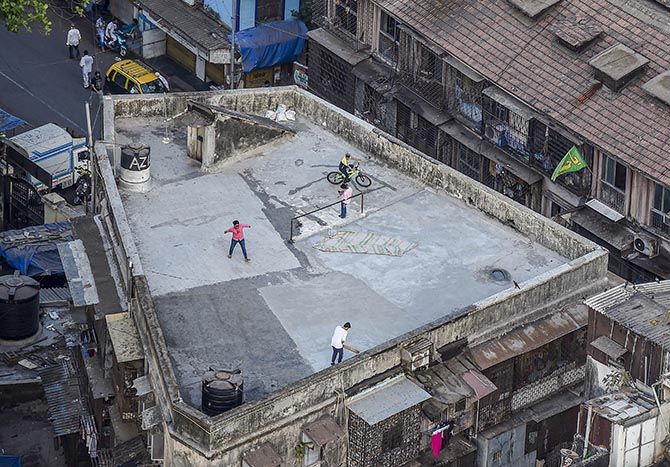'A very vast majority of us will catch it at some point, about 8 out of 10 won't feel much worse than a common cold's nuisance, if at all, but some will die.'
'A very, very vast majority, at least about 98 per cent of those infected, if not more, under any circumstances, will live through it,' observes Shekhar Gupta.

In the coronavirus season, we are daring to pick on two widely accepted truisms.
The first, that tomorrow never comes.
And the second, famously attributed to economist John Maynard Keynes and brought back to us by Dr Manmohan Singh in the course of the Parliament debate on demonetisation: In the long run, we are all dead.
The mood is so despondent that optimism carries the risk of being called insensitive.
The nastiest virus in two generations is travelling the world, needing no passport or visa, and travelling on other people's tickets.
Since the virus is 'novel', no one, king or commoner, is immune to it.
It treats all human beings fairly, with some preference for the famous and the powerful.
Check out Prince Charles, Boris Johnson, Sophie Trudeau, Tom Hanks, global star-chef of Indian origin Floyd Cardoz, and so on.
If it was something hitting just the rich and powerful, the majority could've even treated it with schadenfreude.
That, sadly, is not the case.
Because it is coming for all of us.
In various countries, epidemiologists say between 50 and 80 per cent people will ultimately get infected with this, until we find a vaccine, develop 'herd immunity', or both.
But these percentages are irrelevant.
It is now another flu that will stay on our buffet of deadly viruses, and we will learn to deal with it.
A very vast majority of us will catch it at some point, about 8 out of 10 won't feel much worse than a common cold's nuisance, if at all, but some will die.
A very, very vast majority, at least about 98 per cent of those infected, if not more, under any circumstances, will live through it.
So that underpins our argument with the first of those supposed truisms: Tomorrow never comes.
Let us say, instead, tomorrow always comes.
Indeed, tomorrow never comes if you are lazy, fatalist or defeatist: 'Aaj kare so kal kar, kal kare so parson (leave what needs to be done today for tomorrow, and what must be done tomorrow for the day after)', is a familiar old Hindi taunt for the procrastinator.
But, tomorrow will come.
So, you better figure out what you'll do meanwhile.
Keynes now. Sure as hell, in the long run we are all dead.
But two questions arise.

What do we do with the time we've got meanwhile? Just wait to be dead eventually? Most living beings are never known to live like that, looking forward to death.
Most do their damnedest to make their lives longer.
Even a wretched virus, which is only about half-way a living being biologically.
The second question then: Who decides how long -- or short -- is that 'long run'?
There are many scenarios about how many of us Indians may be affected or killed by the virus.
Epidemiology is in vogue right now.
There are as many estimates therefore as real epidemiologists, pop-epidemiologists, and economists, or snake-oil traders pretending to be epidemiologists.
At one extreme, someone predicts millions of us will die, and maybe half a billion will get infected by July.
At the other, we are told no such thing can happen, the virus will pass us by, our hot weather will vaporise it and what does the little fellow know about the formidable South Asian immune systems.
It is tempting to say the usual: That the truth must lie somewhere in between the two. But it doesn't.
Because, this presumes we, the 1.36 billion people of India, will do nothing to influence our own collective and individual fates.
No people submit themselves to the tyranny of statisticians with fancy projections presuming variables like human and state intervention constant.

I am of the generation that has seen three full-fledged wars (including one humiliating defeat, 1962, and a great victory, 1971), famines, the Green Revolution, ration queues, 'red' American wheat that my mother complained about endlessly for being too hard to be rolled into rotis, smallpox outbreaks, four insurgencies rise and fade in the north east, terrorism in Punjab, the chronic challenge of Kashmir, Babri Masjid, decades of the 'Hindu Rate of growth' and economic reform, 16-year waiting lists for Bajaj scooters and Hero becoming the world's largest maker of two-wheelers, a 'voucher' for an LPG connection from my local MP (Krishan Kant, later vice-president of India) in Chandigarh from his quota as a wedding gift, and an India where almost 100 million connections are given out free.
Footnote: I didn't even get that connection as my MP had exceeded his quota.
My generation has seen both, an India where going overseas meant filling a dozen forms for your $20 quota, or where as a journalist travelling overseas to cover the big wars of the day, you had to line up at the Reserve Bank of India for a permit that would let you draw $165 a day for all expenses, to now when any Indian can freely send up to $250,000 overseas through regular banking channels.
If there is one thing we can say with certainty about our chaotic country, it's that it is always changing.
It never freezes. It isn't North Korea. No insult to that country, just that we are not that disciplined.
Let's talk about disease and epidemics.
Our parents saw plague outbreaks, by our time they had been conquered, never mind that minor commotion of 1994 in Surat.
My generation would carry two or three sizeable scars on an arm or on the hip from smallpox vaccinations.
That scourge was eradicated in 1980.
Indians born then on, or up to 40 years of age already, do not know what that scar is.

My generation, and I personally, survived measles, mumps, at least three spells of typhoid, and god knows what else in small towns which mostly had only one 'MBBS' doctor, in the overcrowded, ramshackle civil hospital.
He diagnosed your fevers, set your broken bones, stitched your wound from a dog-bite, diagnosed the dreadfully painful rash on your mother's arm as Herpes Zoster (shingles). In 1968.
Talking of shingles, you have to be old enough to have endured chickenpox first.
Because the shingles virus comes riding it, sits in your body for decades, and raises its awful head whenever your immunity is lower or as you grow older.
Chances are no Indian under about 30 years of age today will ever get shingles.
Because they ducked chickenpox, thanks to a vaccine popping up and being added to our universal programme.
War-gaming is a sexy pursuit.
Sexier still if you can project more people dying, the end of the world.
And so convenient when those dying aren't your own.
I hear and read that on global media.
An almost regretful incredulity and questions like: So how come India has such low numbers (Richard Quest, CNN last week)?
Read the history of war-gaming and you will know why most of these geniuses go wrong.
Because, they overlook what the 'other' side will be doing.
That 'other' side is we, the people of India, our democracy, free media, civil society, and our noise.
You may or may not like Narendra Damodardas Modi, but even Mr Modi's India isn't Mao's China, where tens of millions would die of hunger and disease and simply ploughed into the ground as manure.
This India will bring you in real time the sight of casual labourers walking back home hundreds of miles away, break your heart, and make any government do something about it.
The short answer, therefore, is while in the long run we will all be dead, we will not be waiting, but doing something meanwhile to stretch that 'run'.
Just that we need to make use of today to build ourselves a better tomorrow.
Maybe closing some other dubious and fixable health issues where we sadly top the world: Tuberculosis, blindness, uterine cancer, even rabies.
Because, remember, tomorrow always comes.
By special arrangement with The Print












 © 2025
© 2025